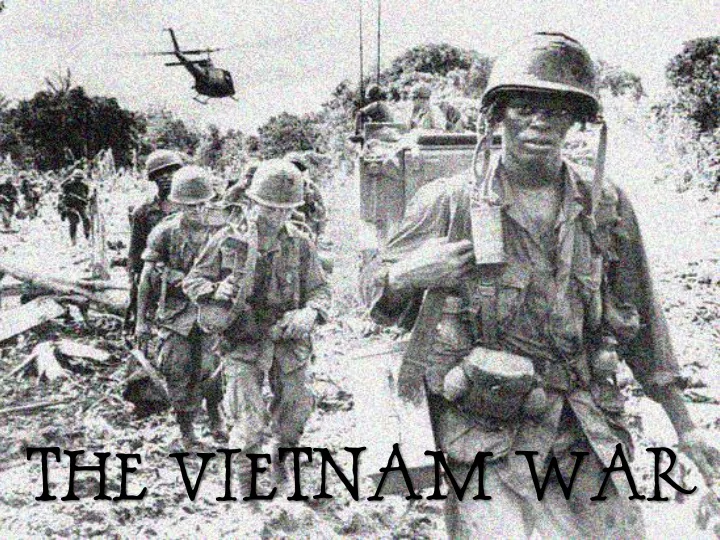

The Vietnam War
Cold War Review • Containment was successful through the 1950s – Truman Doctrine – Marshall Plan – Korean War • BUT…in 1945, US gov’t became concerned with threat of Communism in Asia
Vietnam • Controlled by France since 1887 • 1945: Ho Chi Minh leads war for independence – USA concerned revolution would result in Communist government • Truman and Eisenhower sent aid to France
Vietnam • 1954: France withdrew troops • Vietnam divided at 17 th parallel • Ho Chi Minh h took over the North • Ngo o Dinh Diem em became Democratic leader of the South
Vietnam • Eisenhower & Kennedy supported Diem in South Vietnam • Sent military advisors to put down Communist supporters in S. Vietnam • Nov. 1963: Diem assassinated – Led to chaos in S. Vietnam • LBJ inherited Vietnam “problem”
Gulf of Tonkin • 1964: USS Maddox attacked by North Vietnam in the Gulf of Tonkin • Congress issued the Gulf of Tonkin Resolution which gave LBJ broad powers to “defend Vietnam at any cost” • Led to escalation of US involvement in Vietnam
Escalation • LBJ began sending U.S. troops in 1965 – Goal: CONTAIN N COMMUNISM M • By 1968, over 500,000 U.S. soldiers were fighting in Vietnam
Fighting in Vietnam • US troops were battling the Vietcong – Vietcong: supporters of Communism in South Vietnam • Problem: – difficult to tell who the enemy was – Vietcong used guerilla tactics to combat U.S. military superiority – Jungle made fighting difficult
The Tet Offensive • 1968: the Vietcong launched the Tet Offensive against U.S. forces in South Vietnam • American anti-war movement grew – LBJ announced he would not run for re-election • = a turning point, as the US began to withdraw from Vietnam
Election of 1968 • Chaos of 1968 led Americans to demand peace and stability • Republican Richard Nixon won election
Nixon and Vietnam • “Peace with Honor” • Vietnam amization: gradually withdraw U.S. troops & replace them with South Vietnamese soldiers • secretly sent U.S. troops Led to biggest Cambodia & ordered protests in US bombings of Laos History
Ending the War • 1973, the U.S. & North Vietnam agreed to a cease fire – the U.S. withdrew troops from Vietnam • 1975, North Vietnam invaded South Vietnam – unified the nation under a communist government
Impact of Vietnam • Vietnam was the longest & most divisive war in U.S. history • Of the 3.3 million U.S. soldiers who served: – 58,000 were killed – 303,000 were wounded – 15% were diagnosed with post-traumatic stress disorder after the war – Many vets faced hostility from other U.S. citizens when they returned home
Impact of Vietnam The war changed foreign policy • Containment ended as Americans became cautious of the U.S. role in the world • Congress limited a president's ability to send troops without a declaration of war by passing the War P r Powers s Ac Act in 1973
Impact of Vietnam The war changed America at home • People began to lose faith in the honesty of gov’t leaders during the Johnson & Nixon years • The $176 billion cost of the war led to high inflation in the 1970 & weakened LBJ’s Great Society • The 26th Amendment lowered the voting age to 18 years old
Recommend
More recommend